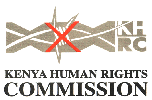The Kenya Human Rights Commission (KHRC) a member organisation of Human Rights House Project in Kenya has rejected the emerging campaign for minimum constitutional reforms that is being pursued by sections of politicians in anticipation of the 2007 General Elections (18-AUG 06)
The original press statement by Kenya Human Rights Commission has edited for publication here by HR/Martin Oluoch – Coordinator Human Rights House Project in Kenya
A press release, signed by the acting Executive Director, Mwambi Mwasaru states that KHRC is profoundly concerned that this campaign is designed only to serve parochial political interests, in stark contrast to the determination, and the inviolable right, of all Kenyans to enjoy a genuinely democratic constitutional order. Kenyans must not wait and watch as the country’s political elite continues to misuse the constitution-making process as a bargaining chip in the pursuit of their own political machinations.
Game of political survival
It is apparent that the varied proposals for minimum constitutional reforms are all simply constitutional devices required by undemocratic, self-serving elites within the ruling coalition, and the opposition, to dominate the Kenyan State in the post-2007 era. Certainly, the proposed reforms seek only to resolve the problem of power-sharing in the run-up to, and after, the 2007 elections, while also facilitating an appropriate political and legal environment in which either faction can deploy its unique ethnic and regional support bases to dominate the State.
Reforms similar to IPPG of 1997
It is glaring that the proposals for minimum constitutional reforms contain no credible references to the vital issues of governance, accountability and human rights that have been the focal points of the long, painful struggle for democratic reforms in Kenya. At this point in our history, Kenyans will do well to recall the set-back to democratic reforms which was occasioned by the hollow, politically-inspired Inter-Parties’ Parliamentary Group (IPPG) minimum constitutional reforms package of 1997. It should be clear that these minimal reforms have had no measurable impact on the state of democracy because they were conceived to serve narrow political interests. Today, the spirit guiding the clamour for minimum reforms is no different. Moreover, the central actors are the same individuals and political parties which short-changed Kenyans in 1997.
Kenya needs a comprehensive constitutional review
The KHRC holds the conviction that the review and enactment of a democratic constitution for Kenya is an urgent national priority which cannot be pegged to a transient, political event such as the anticipated elections of December 2007. Kenyans must demand that the country’s political elite delivers comprehensive, democratic constitutional reforms, whether before or after the 2007 elections. Consequently, the KHRC appeals to all Kenyans to utterly reject any debate or dialogue on minimum constitutional reforms.
The KHRC will continue to offer the necessary leadership to ensure that all stakeholders of good faith engage in a process of dialogue which is aimed at creating a legal framework to guarantee that the State, whether now or in the post-2007 period, will be duty-bound to enact a new, democratic constitution that reflects the wishes of Kenyans on how they want to be governed.





